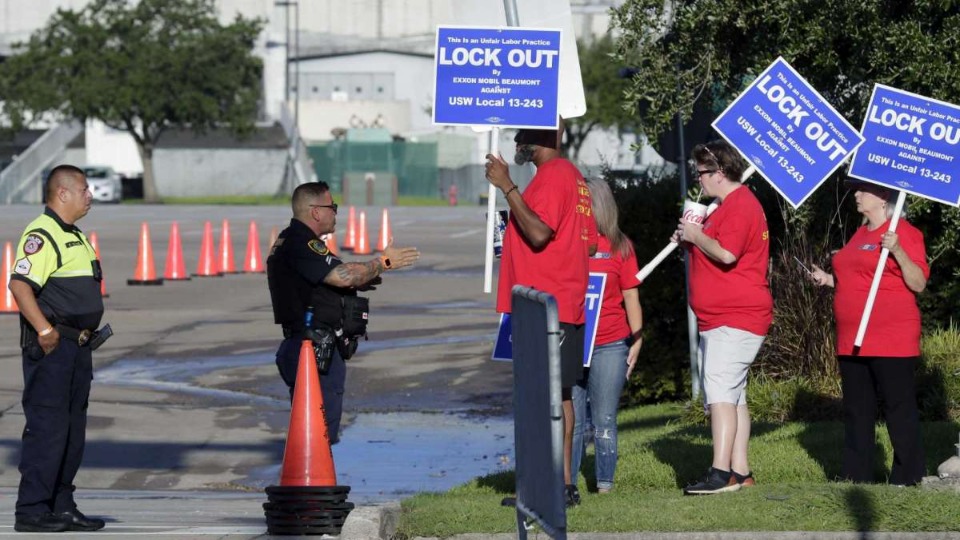
BEAUMONT, Texas (PAI)—In a scenario Texans and Steelworker-represented oil workers in the Lone Star State are familiar with, ExxonMobil’s months-long lockout of 650 USW members from its Beaumont refinery complex increases the risk of a bad accident, AFL-CIO President Liz Shuler warns.
That’s because the firm is using a combination of managers and ill-trained replacement workers to try to keep the refinery going, she added in an Aug. 30 letter to the company’s board member responsible for safety issues.
“ExxonMobil Corporation has locked out its trained and experienced workforce at its petrochemical manufacturing complex in Beaumont, Texas. We believe ExxonMobil’s decision to continue to operate these facilities with temporary replacement workers creates potential safety risks,” Shuler wrote Exxon board member Dr. Susan Avery, chair of its public issues committee. Avery’s committee advises the board on safety.
“We believe the risk of an industrial accident at the Beaumont complex can be best mitigated by negotiating a mutually agreeable end to the lockout,” Shuler said.
On May 1, ExxonMobil locked out the 650 workers, members of USW Local 13-243, a week after it rejected the union’s offer of a one-year contract extension while talks on a new pact continue. And that’s unsafe, said Shuler, an Electrical Worker (IBEW).
“By definition, temporary replacement workers lack the training and experience of a permanent workforce. According to the USW, ExxonMobil also sought to curtail the seniority rights important for maintaining a safe workplace. Taking seniority into account when making decisions about job transfers, promotions, and layoffs can help reduce the risk of industrial accidents,” Shuler warned.
“Needless to say, the safe operation of the Beaumont complex is of great importance to ExxonMobil shareholders as well as the community it operates in,” she said. Shuler cited an academic study showing an average petrochemical plant accident costs the company involved $164 million in market value and each release of toxic chemicals leads to a billion-dollar loss both there and in the surrounding community.
“These negotiations are not about wages,” Local 13-243 President Darrell Kyle said in a posting on the union’s website. “Our greatest concern is making sure our lives and our jobs are safe and secure. Safety in our workplaces also protects our families and community.”
“The union is committed to reaching a mutually acceptable, fair, and equitable agreement. But agreement should come at the bargaining table, without locking out the dedicated, skilled workers at the Beaumont Refinery and Beaumont Blending and Packaging Plant.”
And ExxonMobil has the money to devote to safety, the union said. It made $2.7 billion in profits just in the first quarter of 2021, USW noted. The firm’s website reports profits rose to $4.7 billion in the second quarter.
The Beaumont scenario is eerily similar to a fatal explosion and fire at BP’s Texas City refinery on March 23, 2005. That blast killed 15 workers, most of them contract employees, injured 180 people in the surrounding community due to the release of dangerous gases, left the refinery partially wrecked, and forced massive safety improvements at the plant, whose workers are represented by USW Local 13-1.
It also revealed federal Occupational Safety and Health Administration inspections of refineries for “process safety management,” covering the entire oil refinery process and safeguards against accidents from start to finish, had been intermittent, at best, nationwide. Meantime, then-USW President Leo Gerard said, U.S. refineries were averaging an accident a week, though few were fatal.
But the oil companies were so rigid in refusing to even discuss safety at the next round of nationwide contract negotiations, that USW reluctantly had to strike. The short walkout ultimately won some safety concessions, though not all that USW sought.
Back in Texas City, OSHA and an external investigation forced on BP resulted in wholesale safety improvements there, including process safety inspections. BP also paid fines totaling, ultimately, $87 million. But the progress didn’t last.

In an interview with Press Associates Union News Service and People’s World several years later, after BP sold the Texas City refinery to Marathon Oil, workers from Local 13-1 described in detail backsliding on safety since the ownership transfer, and no OSHA monitoring after the initial compliance agreement BP had to sign with the agency ended. PAI published a two-part special report on the explosion and the follow-up, or lack of it, both at OSHA and on Capitol Hill.
At Beaumont, Local 13-243 is pushing for public support. It’s posted a petition on its website, www.usw13-243.org, for backers to sign. It’s drawn 35,919 signatures so far, out of a 50,000-name goal.
“Over the past year, ExxonMobil was perfectly willing to tell our Steelworker siblings at Local 13-243 they were essential as they worked through the Covid-19 pandemic, hurricanes, floods, and an unprecedented freeze,” the petition says. “Now, ExxonMobil is rewarding that hard work and sacrifice by forcing them off their jobs.
“Sign our pledge to show Exxon our USW family deserves to stay safe on the job and our communities deserve skilled, experienced workers operating the facility,” it declares (their emphasis).
Neither the ExxonMobil website’s press section nor its social media contain any postings on the Beaumont lockout. USW Texas unionists and leaders familiar with the lockout could not return phone calls, due to the hurricanes and similar storms hitting the area.
Support the locked-out workers of USW Local 13-243. Sign the petition on their website.










